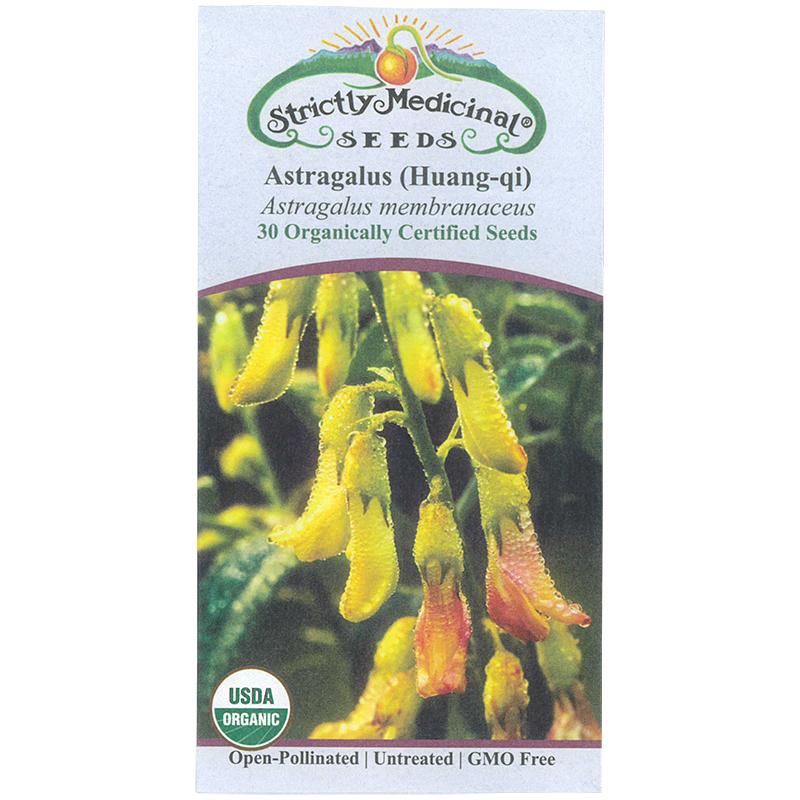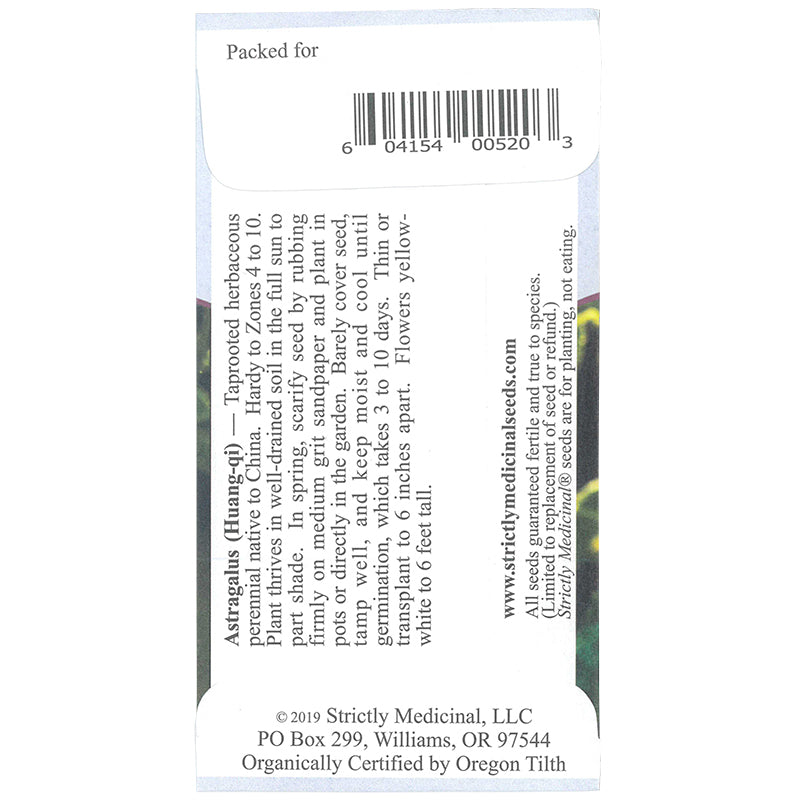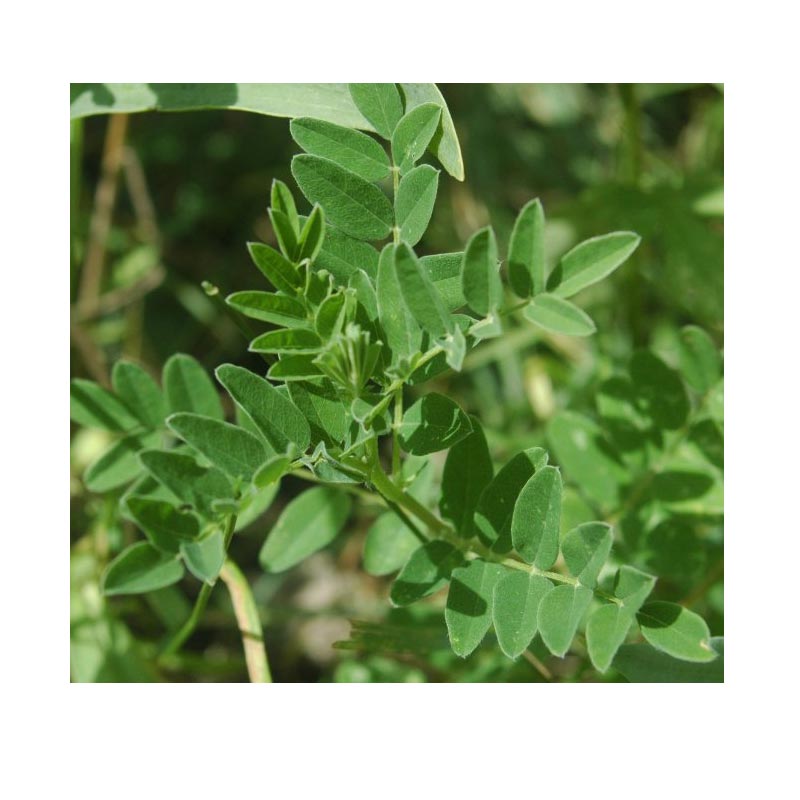Item Number: SNV7004
Astragalus Seeds (Organic)
Astragalus Seeds (Organic)
King of Chinese Herbs
Astragalus (Huang-qi) - Astragalus membranaceus
Perennial. King of Chinese herbs, popular for home use or market. Plants grow to 4 ft. and produce yellow-white flowers.
Approx. 50 seeds
Astragalus, scientifically known as Astragalus membranaceus, and commonly referred to as Huang Qi, is a versatile and revered herb in traditional Chinese medicine and herbalism around the world. The seeds of this perennial plant are highly sought after for their potential health benefits.
Astragalus: An Overview
Astragalus is native to the grasslands of northern and eastern China and has a rich history of medicinal use dating back over 2,000 years. It belongs to the legume family, Fabaceae, and is known for its taproot, which can extend deep into the soil.
Characteristics of Astragalus Seeds:
Appearance: Astragalus seeds are small and oval, with a pale yellow to brownish color. They are often described as kidney-shaped and have a smooth texture.
Flavor and Aroma: Astragalus seeds have a mild, slightly sweet flavor and are often compared to licorice or butterscotch.
Active Compounds: The medicinal properties of Astragalus seeds are attributed to various bioactive compounds, including polysaccharides, saponins, flavonoids, and astragalosides.
Health Benefits and Uses:
Astragalus has gained recognition for its potential health benefits* and is traditionally used to:
Boost Immunity: Astragalus is considered an adaptogen, helping the body adapt to stressors. It may enhance the immune system's response to infections and diseases, potentially reducing the risk of illness.
Support Heart Health: Some studies suggest that Astragalus may help improve heart health by reducing blood pressure, enhancing blood flow, and lowering cholesterol levels.
Anti-Inflammatory Properties: The herb exhibits anti-inflammatory effects, which may be useful for managing conditions associated with inflammation, such as arthritis.
Fatigue and Energy: Astragalus is often used to combat fatigue and improve overall energy levels. It may help reduce the feeling of tiredness and promote vitality.
Antioxidant Effects: The flavonoids and astragalosides in Astragalus seeds possess antioxidant properties that protect cells from oxidative stress and damage.
Respiratory Health: Astragalus is used to support respiratory health and may alleviate symptoms of conditions like colds, allergies, and asthma.
Cultivating Astragalus Seeds:
Climate and Soil: Astragalus thrives in well-draining soil with a neutral to slightly alkaline pH. It prefers full sun but can tolerate partial shade. The plant is hardy and can withstand various climates.
Sowing Seeds: Start by scarifying the seeds, which involves gently nicking or sanding the hard outer seed coat. This aids in germination. Soak the scarified seeds in warm water for a few hours before planting.
Planting Depth: Sow the Astragalus seeds about 1/4 inch deep in prepared soil, spaced a few inches apart. Water the area thoroughly after planting.
Germination: Astragalus seeds can take several weeks to germinate. Keep the soil consistently moist but not waterlogged during this period.
Transplanting: Once the seedlings have grown large enough, they can be transplanted into their final location, spacing them about 12 to 18 inches apart.
Maintenance: Astragalus is a low-maintenance plant. Provide regular watering, especially during dry spells, and keep the area free of weeds.
Harvesting Astragalus Roots:
The primary medicinal part of Astragalus is its taproot. Harvest the roots in the fall or early spring of the plant's fourth or fifth year when they have reached sufficient size. Clean, dry, and store the roots in a cool, dry place for future use.
Astragalus, with its mild flavor and potential health benefits, is a valuable addition to any herbal garden. Whether you're looking to enhance your immune system, support heart health, or combat fatigue, Astragalus seeds can be a versatile and rewarding addition to your herbal repertoire. When grown and harvested with care, this medicinal herb can play a significant role in promoting health and wellness.
* Please see a physician for information on health benefits and risks.
Photo by Doronenko


Check Your Zone Compatibility:
Compatible with your zone.
Growing Zone for
,

Our Guarantee To You
Since 1976, we've served our customers at every stage of growing. Please contact us at any time. We are happy to support and assist you.
Description
Description
Astragalus (Huang-qi) - Astragalus membranaceus
Perennial. King of Chinese herbs, popular for home use or market. Plants grow to 4 ft. and produce yellow-white flowers.
Approx. 50 seeds
Astragalus, scientifically known as Astragalus membranaceus, and commonly referred to as Huang Qi, is a versatile and revered herb in traditional Chinese medicine and herbalism around the world. The seeds of this perennial plant are highly sought after for their potential health benefits.
Astragalus: An Overview
Astragalus is native to the grasslands of northern and eastern China and has a rich history of medicinal use dating back over 2,000 years. It belongs to the legume family, Fabaceae, and is known for its taproot, which can extend deep into the soil.
Characteristics of Astragalus Seeds:
Appearance: Astragalus seeds are small and oval, with a pale yellow to brownish color. They are often described as kidney-shaped and have a smooth texture.
Flavor and Aroma: Astragalus seeds have a mild, slightly sweet flavor and are often compared to licorice or butterscotch.
Active Compounds: The medicinal properties of Astragalus seeds are attributed to various bioactive compounds, including polysaccharides, saponins, flavonoids, and astragalosides.
Health Benefits and Uses:
Astragalus has gained recognition for its potential health benefits* and is traditionally used to:
Boost Immunity: Astragalus is considered an adaptogen, helping the body adapt to stressors. It may enhance the immune system's response to infections and diseases, potentially reducing the risk of illness.
Support Heart Health: Some studies suggest that Astragalus may help improve heart health by reducing blood pressure, enhancing blood flow, and lowering cholesterol levels.
Anti-Inflammatory Properties: The herb exhibits anti-inflammatory effects, which may be useful for managing conditions associated with inflammation, such as arthritis.
Fatigue and Energy: Astragalus is often used to combat fatigue and improve overall energy levels. It may help reduce the feeling of tiredness and promote vitality.
Antioxidant Effects: The flavonoids and astragalosides in Astragalus seeds possess antioxidant properties that protect cells from oxidative stress and damage.
Respiratory Health: Astragalus is used to support respiratory health and may alleviate symptoms of conditions like colds, allergies, and asthma.
Cultivating Astragalus Seeds:
Climate and Soil: Astragalus thrives in well-draining soil with a neutral to slightly alkaline pH. It prefers full sun but can tolerate partial shade. The plant is hardy and can withstand various climates.
Sowing Seeds: Start by scarifying the seeds, which involves gently nicking or sanding the hard outer seed coat. This aids in germination. Soak the scarified seeds in warm water for a few hours before planting.
Planting Depth: Sow the Astragalus seeds about 1/4 inch deep in prepared soil, spaced a few inches apart. Water the area thoroughly after planting.
Germination: Astragalus seeds can take several weeks to germinate. Keep the soil consistently moist but not waterlogged during this period.
Transplanting: Once the seedlings have grown large enough, they can be transplanted into their final location, spacing them about 12 to 18 inches apart.
Maintenance: Astragalus is a low-maintenance plant. Provide regular watering, especially during dry spells, and keep the area free of weeds.
Harvesting Astragalus Roots:
The primary medicinal part of Astragalus is its taproot. Harvest the roots in the fall or early spring of the plant's fourth or fifth year when they have reached sufficient size. Clean, dry, and store the roots in a cool, dry place for future use.
Astragalus, with its mild flavor and potential health benefits, is a valuable addition to any herbal garden. Whether you're looking to enhance your immune system, support heart health, or combat fatigue, Astragalus seeds can be a versatile and rewarding addition to your herbal repertoire. When grown and harvested with care, this medicinal herb can play a significant role in promoting health and wellness.
* Please see a physician for information on health benefits and risks.
Photo by Doronenko
Shipping Information
Shipping Information
Shipping Weight: 0.01 lb
Dimensions: 5.0"L x 2.625"W x 0.1"H
Features
Features
- Good for Drying
- Mild Flavor
- Open-Pollinated
- Requires Summer Water
Characteristics
Characteristics
Planting & Care
Planting & Care
Soil & Water: Plant thrives in part to full sun in well drained soil. Inoculate soil or seed with mycorrhizal bacteria to assist with germination and growth.
Planting & Growing: In spring, scarify seed and plant in pots or directly in garden. Barely cover and tamp well, keeping moist and cool until germination which can take 1-3 weeks. Thin or transplant to 1 foot apart.
Harvesting & Storage: Root requires several years to grow to harvestable size. Slice harvested root, dry and store in jars.
Useful Information
Useful Information
Guarantee
Guarantee
Share
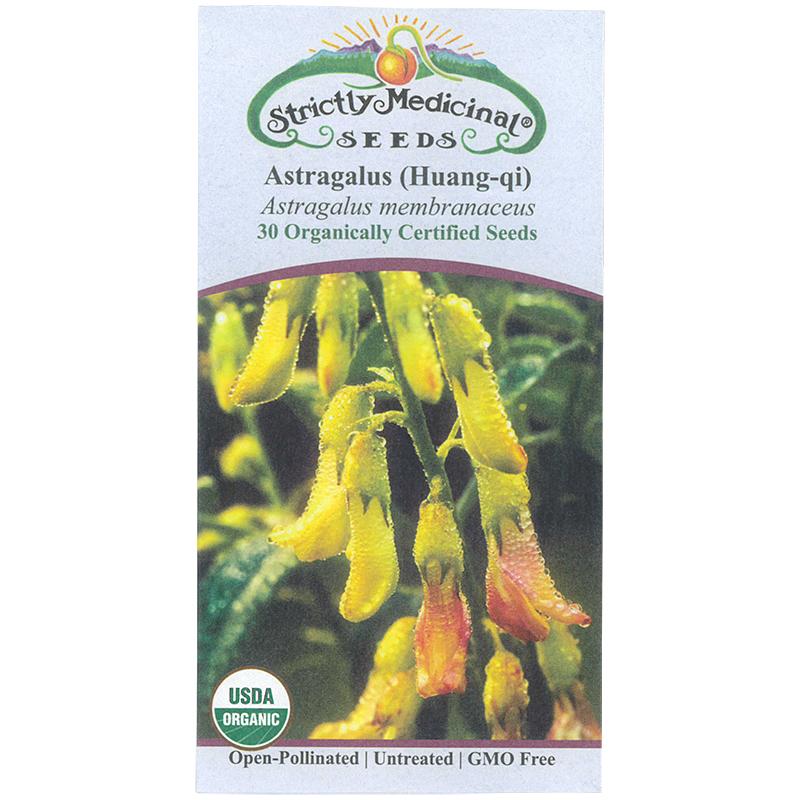
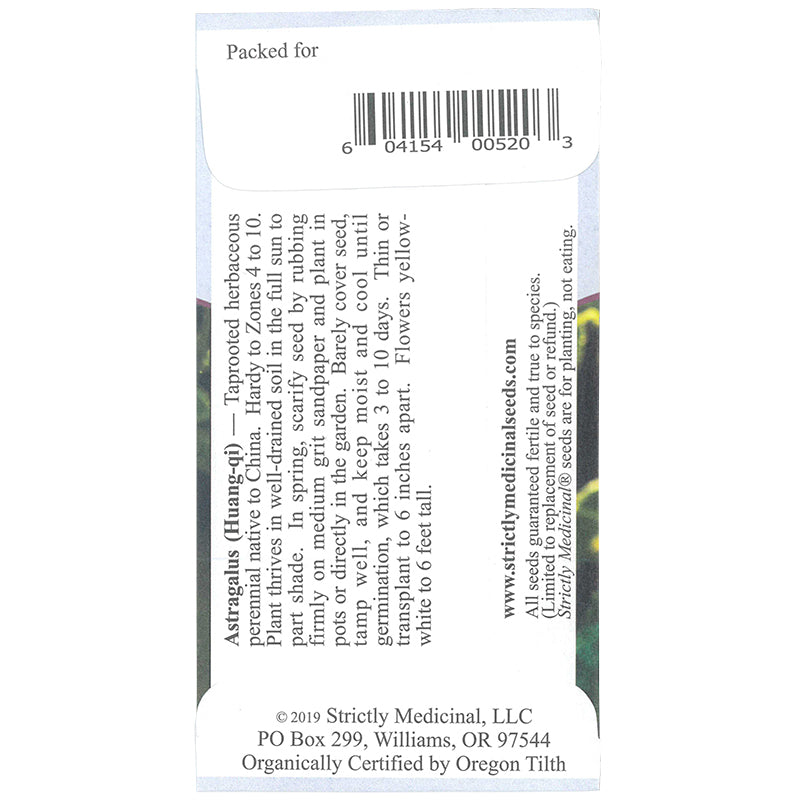
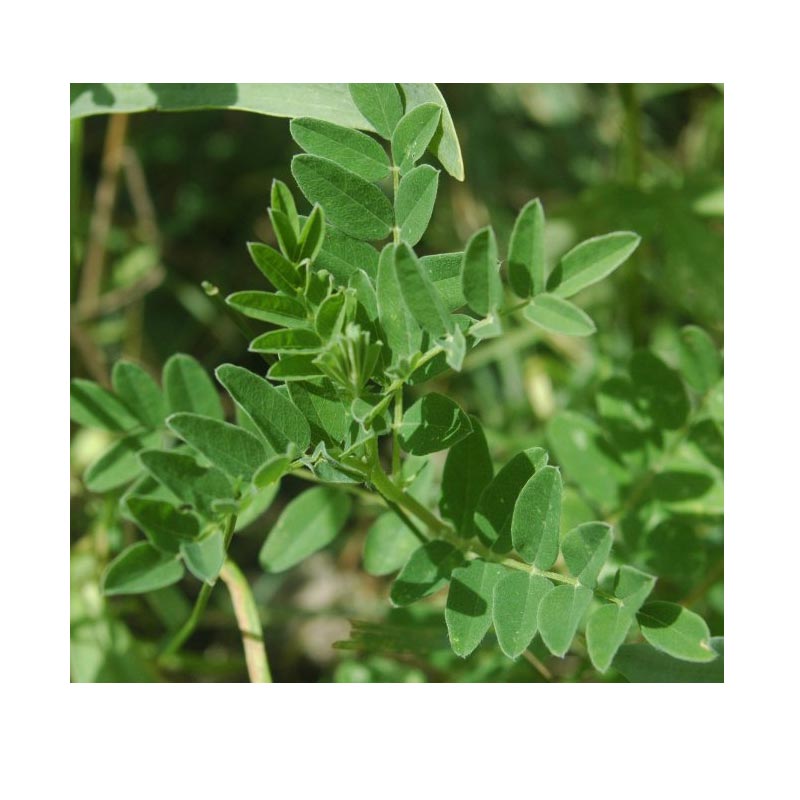
While astragulus seed does have a naturally low germination rate (only 3 seeds out of my pack germinated and grew to maturity), I ended up with very healthy plants that flowered beautifully their second year. I did inoculate their soil with mycorrhizal fungi and grew them in full sun with very little supplemental water. The pollinators loved the flowers and I got many seeds from my plants for future generations. I look forward to harvesting roots in a few years.
I was very happy to find astragalus. I haven't plantedcit yet. Still growing the seedling inside.
Looking forward to planting it in my community garden.

